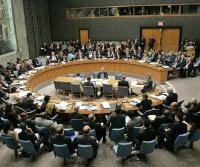Who cares about the United Nations Security Council? Over the past year, major powers have certainly been taking the council increasingly seriously. U.N. experts who argue that the council's credibility rests on its appeal to big players in the global system were comforted by Germany, India and South Africa's successful campaigns for two-year seats on the council last year.
But some poor, weak governments have decided to defy it, with a series of African leaders, in particular, showing contempt for the council's authority. In January 2010, President Idriss Déby of Chad insisted that the U.N. withdraw peacekeepers charged with protecting refugee camps in eastern Chad, claiming that the troops were incompetent. Humanitarian officials warned that their withdrawal risked putting thousands of Darfuri refugees living in the camps in danger. Despite strenuous behind-the-scenes diplomacy, the council could not persuade Déby to back down, and the peacekeepers packed up.
The council had better luck with the Democratic Republic of Congo's President Joseph Kabila, who also demanded that the U.N. withdraw its 25,000-strong peacekeeping force from his country last spring. Eventually, Kabila accepted a token downsizing of the force, but the council revised the mission's mandate to underline that the blue helmets are there to back up the DRC's feckless army. Now the U.N. is struggling with how to dispose of Côte d'Ivoire's unrecognized president, Laurent Gbagbo, who has ignored calls from the council and U.N. Secretary-General Ban Ki-moon to stand down after December's disputed elections.

